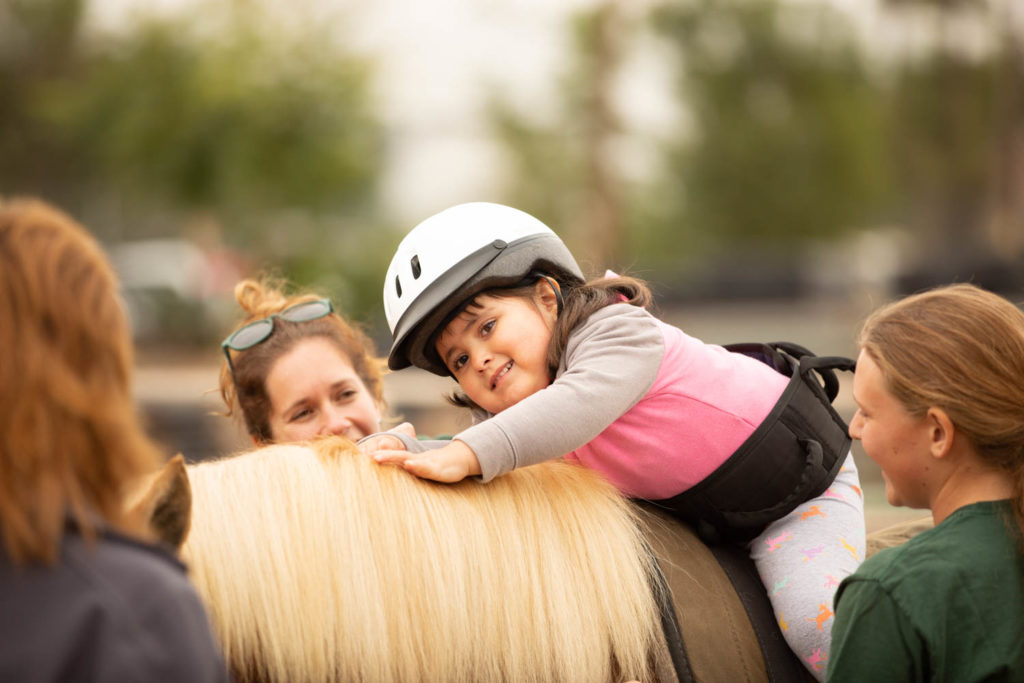
Almost exactly one year to the day after breaking ground on the building, the doors of the newly constructed Temple Grandin Equine Center on Colorado State University’s Foothills Campus quietly opened in February to begin providing equine-assisted services to community members.
The state-of-the-art facility, named for Department of Animal Sciences faculty member and autism advocate Temple Grandin, was created to be a place of healing, treatment, education and research for clients from diverse backgrounds. The center is the new home of one of the leading equine-assisted services education and research programs in the world.
Equine-assisted services include a range of activities and therapies that integrate the use of horses to promote human physical and mental health. Every weekday, the center provides medically necessary physical, occupational and speech therapy services to children with autism, cerebral palsy, Down Syndrome and other health conditions, veterans with PTSD, and seniors with Alzheimer’s or other dementias.
“The role of the horse in society is expanding,” says Adam Daurio, the center’s director of administration and outreach. “The Temple Grandin Equine Center celebrates and elevates the role of the horse in society. In addition to the racehorse and ranch horse, now the horse can be a tool that is partnered with in health care.”
Research first
With COVID-19 protocols in place, about 75 clients are now seen at the center each week for research, evaluation and therapy. Research and therapy appointments have been the initial focus of the center, which will also host education and outreach activities, including undergraduate classes and community programming.
Two Temple Grandin Equine Centers
The new Temple Grandin Equine Center in Fort Collins serves as the hub for equine-assisted education and research. In 2022, a second facility will open at the new CSU Spur campus at the National Western Complex in Denver, housed in the Vida building. The Denver location will expand community outreach capabilities, and act as a complement to Fort Collins’ research programs for CSU students to collect data, and complete internships, externships and practicums. The Denver center will also have an increased focus on mental health services.
Occupational therapy in an equine environment
In early February, a new study launched at the center focused on occupational therapy in an equine environment for youth with autism. Caiti Peters, an occupational therapist and postdoctoral fellow in the CSU Department of Animal Sciences, is leading the study, which builds on previous research conducted by an interdisciplinary team that also includes researchers from the departments Human Development and Family Studies and Occupational Therapy.
The current study includes 20 participants, ages 6-13, who are on the autism spectrum and exhibit symptoms of an additional psychiatric condition that results in anxiety, hyperactivity, depression, or high levels of irritability. Participants are working on self-regulation and social skills, with a goal of increased social functioning, caregiver quality of life, and functional behaviors. The study includes 10 weeks of occupational therapy in the center’s clinic environment, followed by 10 weeks of therapy in the equine environment.
During the first 10 weeks, participants receive services in the center’s new outpatient therapy clinic space without any interaction with horses. Therapists use activities such as games, swinging and the use of a climbing wall, to optimize attention and engagement while controlling for critical elements that will be incorporated during occupational therapy in an equine environment.
“It’s unique that we have a facility that can offer occupational therapy in a standard clinic environment as well as occupational therapy that incorporates horses,” says Peters. “To be able to provide both of those services on campus elevates the quality of our research.”
During the second 10 weeks, participants transition to the center’s equine environment, where they mount and ride a horse with the assistance of occupational therapists and volunteers. The horse’s movement provides sensory input that can be regulating for youth with autism and help them maintain an optimal calm state that provides a foundation to learn new skills. Building on this foundation, occupational therapists engage participants in mounted games designed to teach and practice social skills, such as turn-taking.
Comparing occupational therapy outcomes in two different environments will help researchers understand if horses are effective in helping clients achieve their goals.
“Having the horse included in occupational therapy provides an opportunity to work on functional goals in a way that’s fun and motivating and potentially more effective for youth with autism,” Peters says.
The study is funded by Human-Animal Bond in Colorado through the Human-Animal Interaction Pilot Grant and conducted in collaboration with Hearts & Horses Therapeutic Riding Center, which provides therapists, volunteers, and site-coordination for the project. Findings from the current phase will provide a strong foundation for a future controlled trial.
The study, “Occupational Therapy in an Equine Environment: Harnessing Occupation for Self-Regulation, Social Communication, and Play in Youth with Autism,” is currently recruiting additional participants to begin in May. View the study requirements here.
Volunteer at the Temple Grandin Equine Center
For every licensed therapist who works with clients at the Temple Grandin Equine Center, typically three volunteers support their work by helping as horse leaders and side-walkers. Volunteers also maintain the horses and the facility, assisting with cleaning, grooming, tacking, and providing some basic care.
If you are interested in general volunteer opportunities, contact the Temple Grandin Equine Center at templegrandinequinecenter@colostate.edu or (970) 491-1651.
If you are interested in participating or volunteering as a horse leader or side-walker for the current study, contact Caiti Peters at (720) 665-0023 or OTautismStudy@gmail.com.